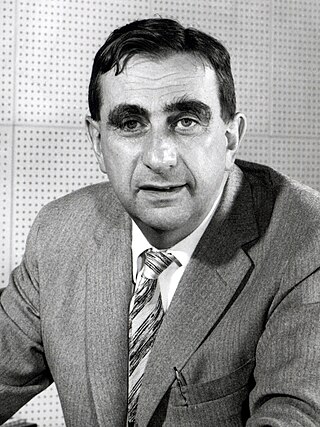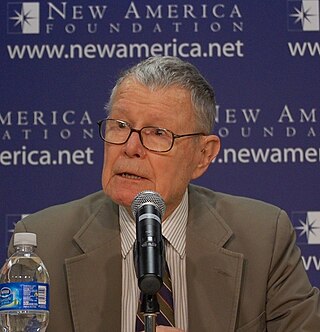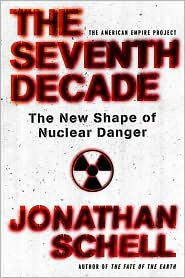
Edward Teller was a Hungarian-American theoretical physicist and chemical engineer who is known colloquially as "the father of the hydrogen bomb" and one of the creators of the Teller–Ulam design.

The Atomic Age, also known as the Atomic Era, is the period of history following the detonation of the first nuclear weapon, The Gadget at the Trinity test in New Mexico on 16 July 1945 during World War II. Although nuclear chain reactions had been hypothesized in 1933 and the first artificial self-sustaining nuclear chain reaction had taken place in December 1942, the Trinity test and the ensuing bombings of Hiroshima and Nagasaki that ended World War II represented the first large-scale use of nuclear technology and ushered in profound changes in sociopolitical thinking and the course of technological development.
Karl Shuker is a British zoologist, cryptozoologist and author. He lives in the Midlands, England, where he works as a zoological consultant and writer. A columnist in Fortean Times and contributor to various magazines, Shuker is also the editor-in-chief of the Journal of Cryptozoology, which began in November 2012.

Thomas Crombie Schelling was an American economist and professor of foreign policy, national security, nuclear strategy, and arms control at the School of Public Policy at University of Maryland, College Park. He was also co-faculty at the New England Complex Systems Institute.
Jonathan Dermot Spence was a British-American historian, sinologist, and author who specialised in Chinese history. He was Sterling Professor of History at Yale University from 1993 to 2008. His most widely read book is The Search for Modern China, a survey of the last several hundred years of Chinese history based on his popular course at Yale. A prolific author, reviewer, and essayist, he published more than a dozen books on China. Spence's major interest was modern China, especially the Qing dynasty, and relations between China and the West. Spence frequently used biographies to examine cultural and political history. Another common theme is the efforts of both Westerners and Chinese "to change China", and how such efforts were frustrated.

Jonathan Edward Schell was an American author and visiting fellow at Yale University, whose work primarily dealt with campaigning against nuclear weapons.

The Known World is a 2003 historical novel by Edward P. Jones. Set in Virginia during the antebellum era, it examines the issues regarding the ownership of Black slaves by both White and Black Americans.
Michael Mandelbaum is a professor and director of the American Foreign Policy program at the Johns Hopkins University, School of Advanced International Studies. He has written a number of books on American foreign policy and edited a dozen more.

Alex Ross is an American music critic and author who specializes in classical music. Ross has been a staff member of The New Yorker magazine since 1996. His extensive writings include performance and record reviews, industry updates, cultural commentary, and historical narratives in the realm of classical music. He has written three well-received books: The Rest Is Noise: Listening to the Twentieth Century (2007), Listen to This (2011), and Wagnerism: Art and Politics in the Shadow of Music (2020).
The 21st century in literature refers to world literature produced during the 21st century. The measure of years is, for the purpose of this article, literature written from (roughly) the year 2001 to the present.

Juragua Nuclear Power Plant was a nuclear power plant under construction in Cuba when a suspension of construction was announced in 1992 following the collapse of the Soviet Union and the termination of Soviet economic aid to Cuba. Russia and Cuba sought third-country financing to complete the plant in the mid-1990s but in 2000 the two countries agreed to abandon the project.

A nuclear holocaust, also known as a nuclear apocalypse, nuclear annihilation, nuclear armageddon, or atomic holocaust, is a theoretical scenario where the mass detonation of nuclear weapons causes widespread destruction and radioactive fallout. Such a scenario envisages large parts of the Earth becoming uninhabitable due to the effects of nuclear warfare, potentially causing the collapse of civilization, the extinction of humanity, and/or the termination of most biological life on Earth. Nuclear holocaust became an anti-nuclear issue with the start of nuclear weapons testing, which caused a global fallout with deaths of an estimated 2.4 million people globally until 2020.

The Gift of Time: The Case for Abolishing Nuclear Weapons Now is a 1998 book by Jonathan Schell. The book is based on interviews with individuals who had responsibility for nuclear weapons policy in the United States, Russia and Europe, and who came to advocate the global elimination of nuclear weapons. Schell addresses the key issues of nuclear deterrence, disarmament, abolition, and breakout associated with nuclear weapons policy.

The Seventh Decade: The New Shape of Nuclear Danger is a 2007 book by Jonathan Schell. It is described as a provocative book which explores the threat posed by some new nuclear policies of the United States.
The American Empire Project is a book series that deals with imperialist and exceptionalist tendencies in US foreign policy in the early 21st century. The series is published by Metropolitan Books and includes contributions by such notable American thinkers and authors as Noam Chomsky, Howard Zinn, Chalmers Johnson and Andrew Bacevich. The project's goal is to critique what the authors consider the imperial ambitions of the United States and to explore viable alternatives for foreign policy.

The Fate of the Earth is a 1982 book by Jonathan Schell. Its description of the consequences of nuclear war "forces even the most reluctant person to confront the unthinkable: the destruction of humanity and possibly most life on Earth". The work is regarded as a key document in the nuclear disarmament movement.
Bruce Gentry Blair was an American nuclear security expert, research scholar, national security expert, the author of articles and books on nuclear topics, and a television show producer.

The Corrections is a 2001 novel by American author Jonathan Franzen. It revolves around the troubles of an elderly Midwestern couple and their three adult children, tracing their lives from the mid-20th century to "one last Christmas" together near the turn of the millennium. The novel was awarded the National Book Award in 2001 and the James Tait Black Memorial Prize in 2002.
Jonathan Sperber is an American academic and historian who is a professor emeritus at the University of Missouri and author of modern European History.












